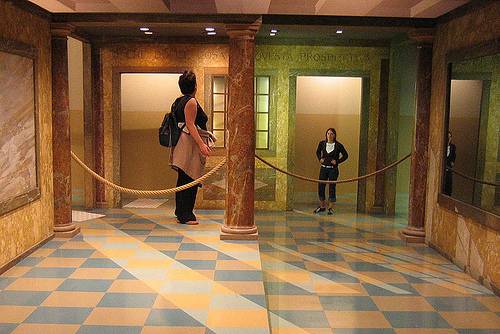Last March I remarked on a curious experiment that defies common sense but is corroborated by several independent accounts, from Samuel Pepys to David Brewster.
Well, here’s another one. In Endless Amusement: A Collection of Nearly 400 Entertaining Experiments in Various Branches of Science (1821), we find an item headed “The Hour of the Day or Night Told by a Suspended Shilling”:
However improbable the following experiment may appear, it has been proved by repeated trials:
Sling a shilling or sixpence at the end of a piece of thread by means of a loop. Then resting your elbow on a table, hold the other end of the thread betwixt your forefinger and thumb; observing to let it pass across the ball of the thumb, and thus suspend the shilling into an empty goblet. Observe, your hand must be perfectly steady; and if you find it difficult to keep it in an immoveable posture, it is useless to attempt the experiment. Premising, however, that the shilling is properly suspended, you will observe, that when it has recovered its equilibrium, it will for a moment be stationary: it will then of its own accord, and without the least agency from the person holding it, assume the action of a pendulum, vibrating from side to side of the glass; and, after a few seconds, will strike the hour nearest to the time of day; for instance, if the time be twenty-five minutes past six, it will strike six; if thirty-five minutes past six, it will strike seven, and so of any other hour.
It is necessary to observe, that the thread should lay over the pulse of the thumb, and this may in some measure account for the vibration of the shilling; but to what cause its striking the precise hour is to be traced, remains unexplained; for it is no less astonishing than true, that when it has struck the proper number, its vibration ceases, it acquires a kind of rotary motion, and at last becomes stationary, as before.
This is worth trying even if you think it’s balderdash, as the effect is striking. In my trials the plumb hung true for a full minute, but then it did indeed begin swinging, tolled the hour, and then hung quietly again.
Who came up with this? From what I can tell, the item first appeared in the European Magazine of June or July 1819, and it seems to have inspired a fitful scientific debate around England. The Monthly Magazine (May 1, 1820) called it “legerdemain”; a letter in The Kaleidoscope (Nov. 22, 1823) confirmed the effect, “but why its movements should be regulated to the precise hour of the day I cannot possibly account for.” The Minerva (July 24, 1824) gave a fairly straightforward account of the technique; and The English Mechanic (June 14, 1872) expressed polite bafflement.
Interestingly, when The Magazine of Science, and School of Arts (Jan. 1, 1842) opined that “there is no truth whatever in the experiment,” a science-minded reader wrote in to disagree, detailing numerous trials with various materials at various hours and concluding that “I honestly confess I cannot explain it.” He offered these notes if you’d like to try it yourself:
- “I remarked on many occasions, that should the suspended coin fail of striking all the hours consecutively, it will vibrate on until it obtains momentum to perform its work.”
- “The operator must have a steady hand and arm and a fair proportion of patience.”
- It seems to work best with a metal weight, a silk string, and a warm glass.




